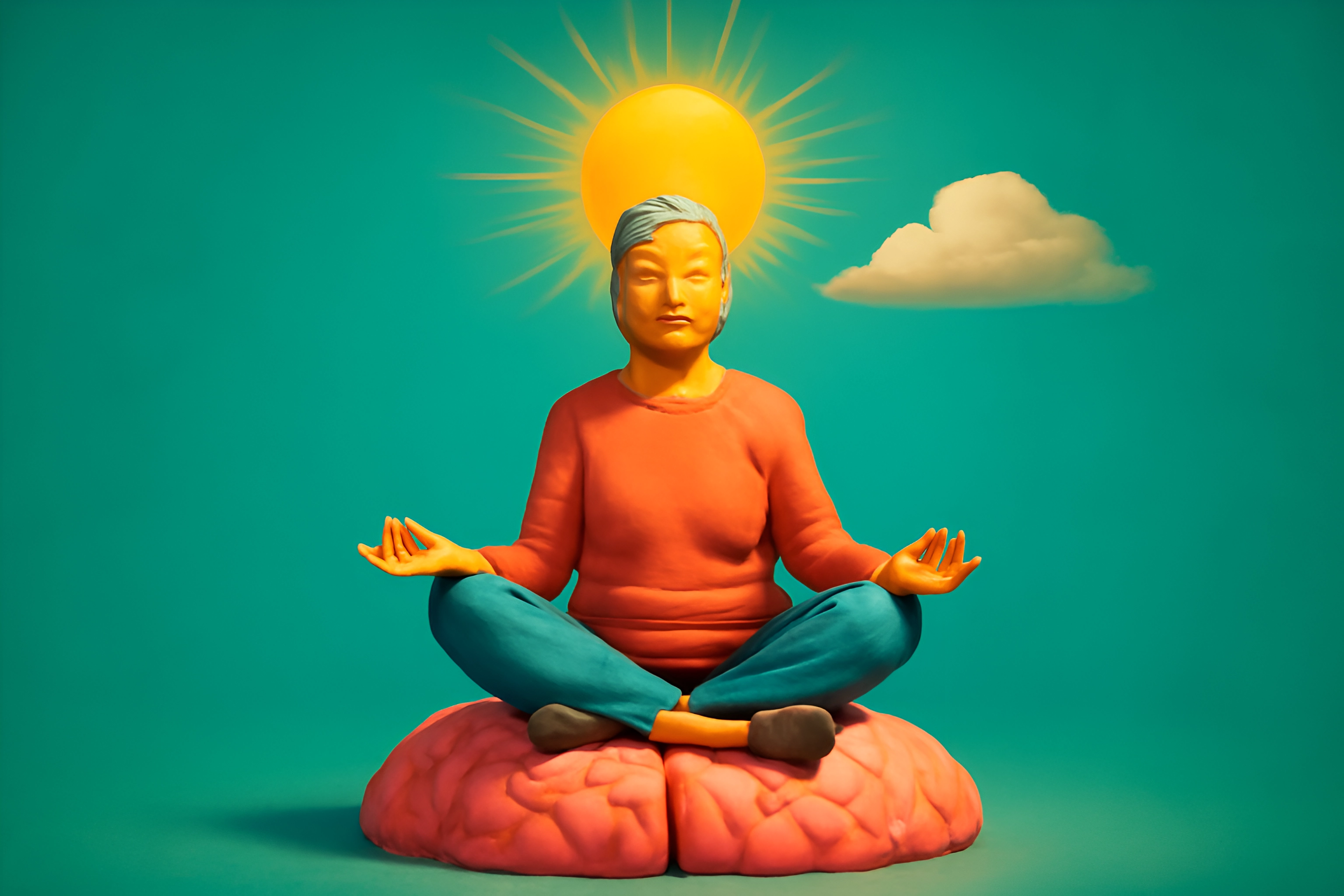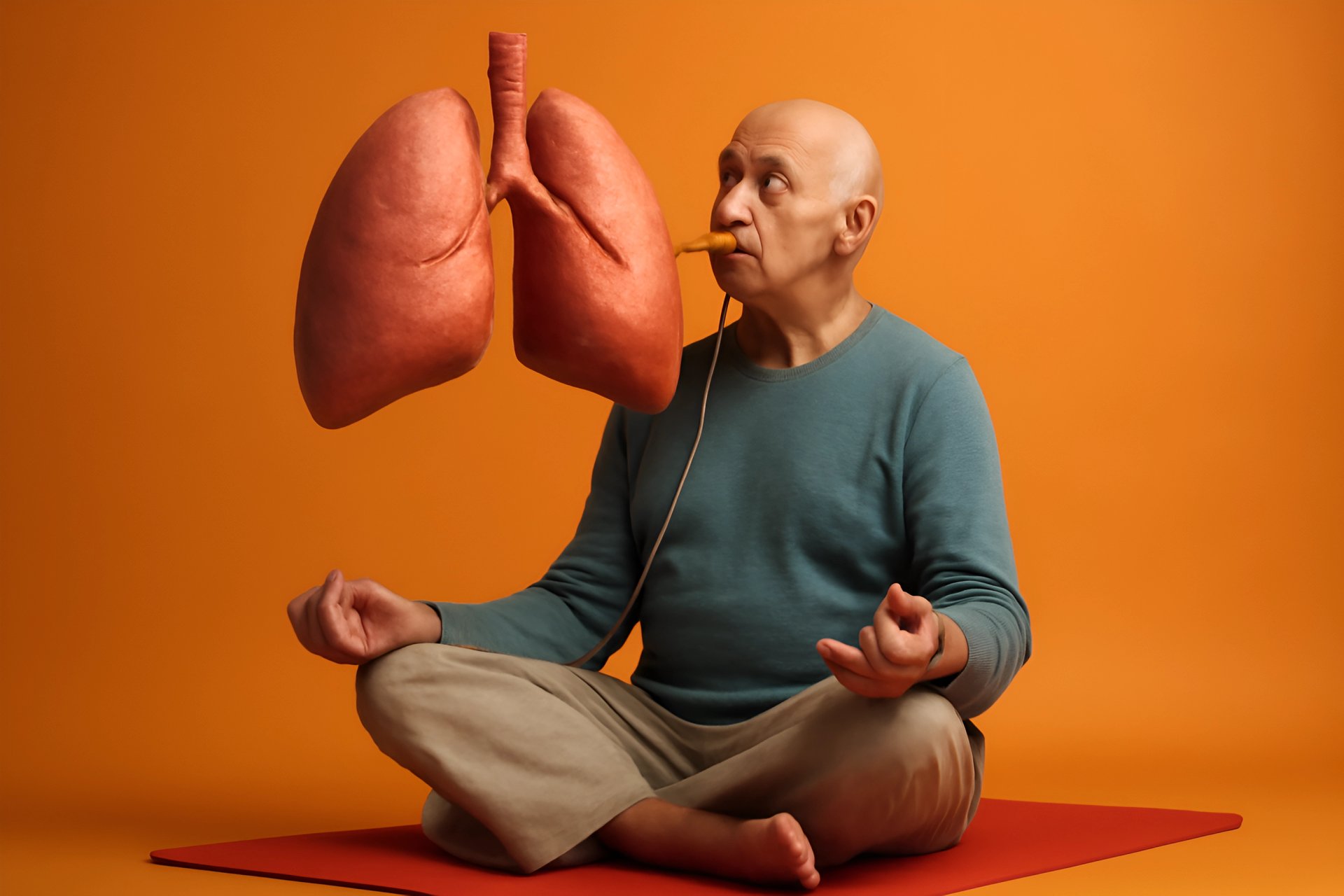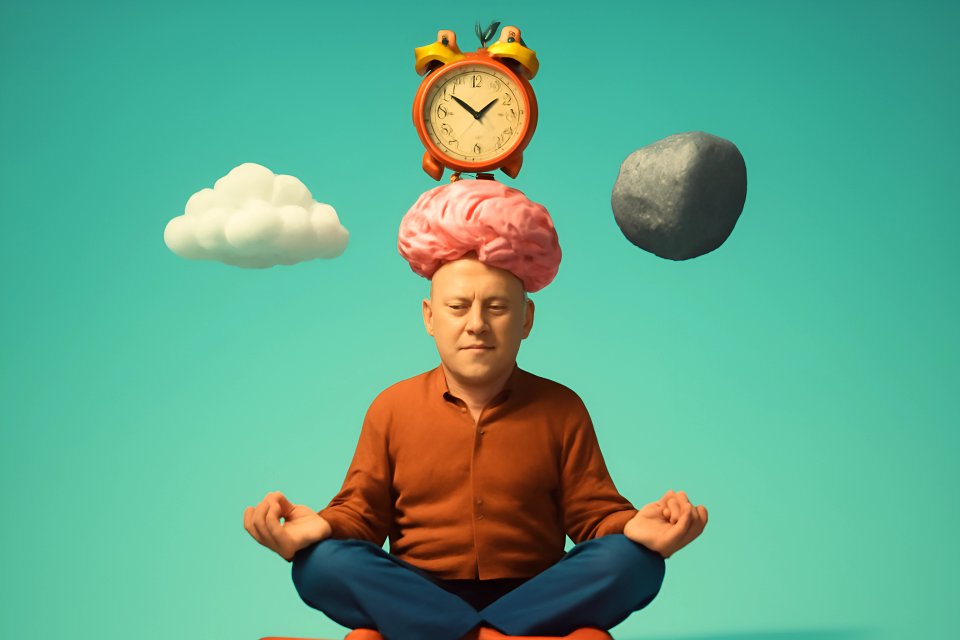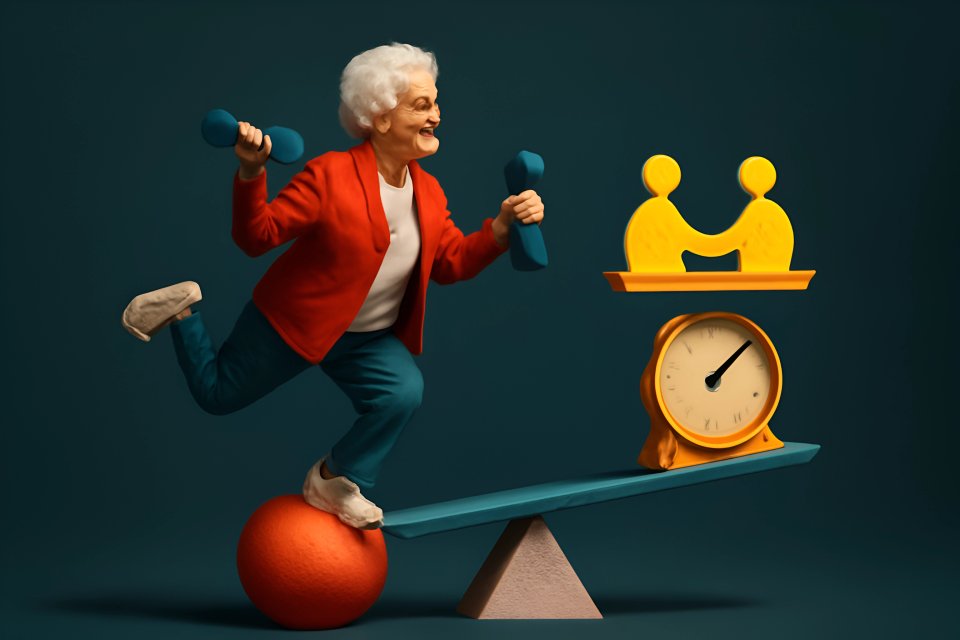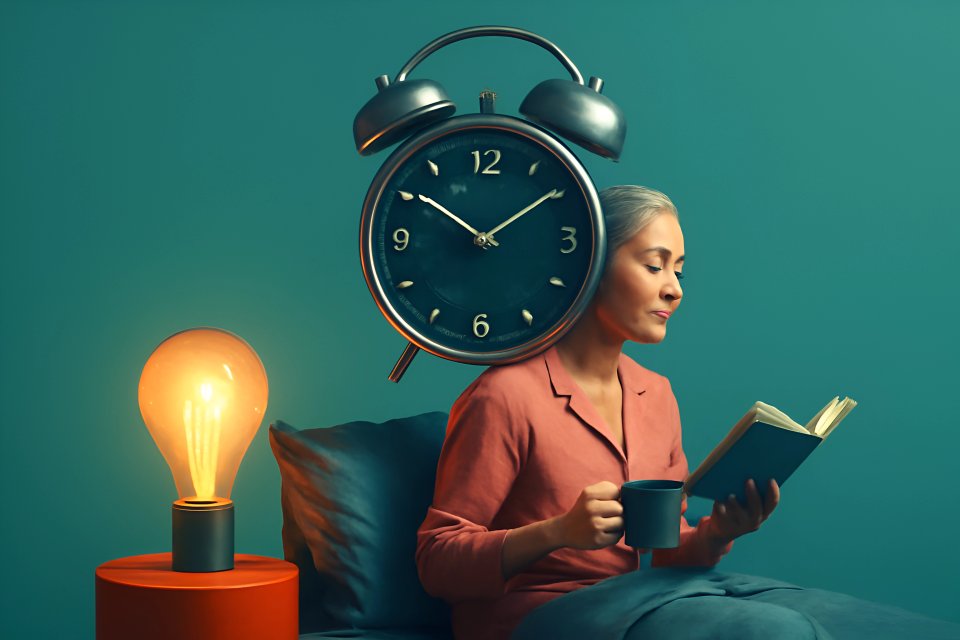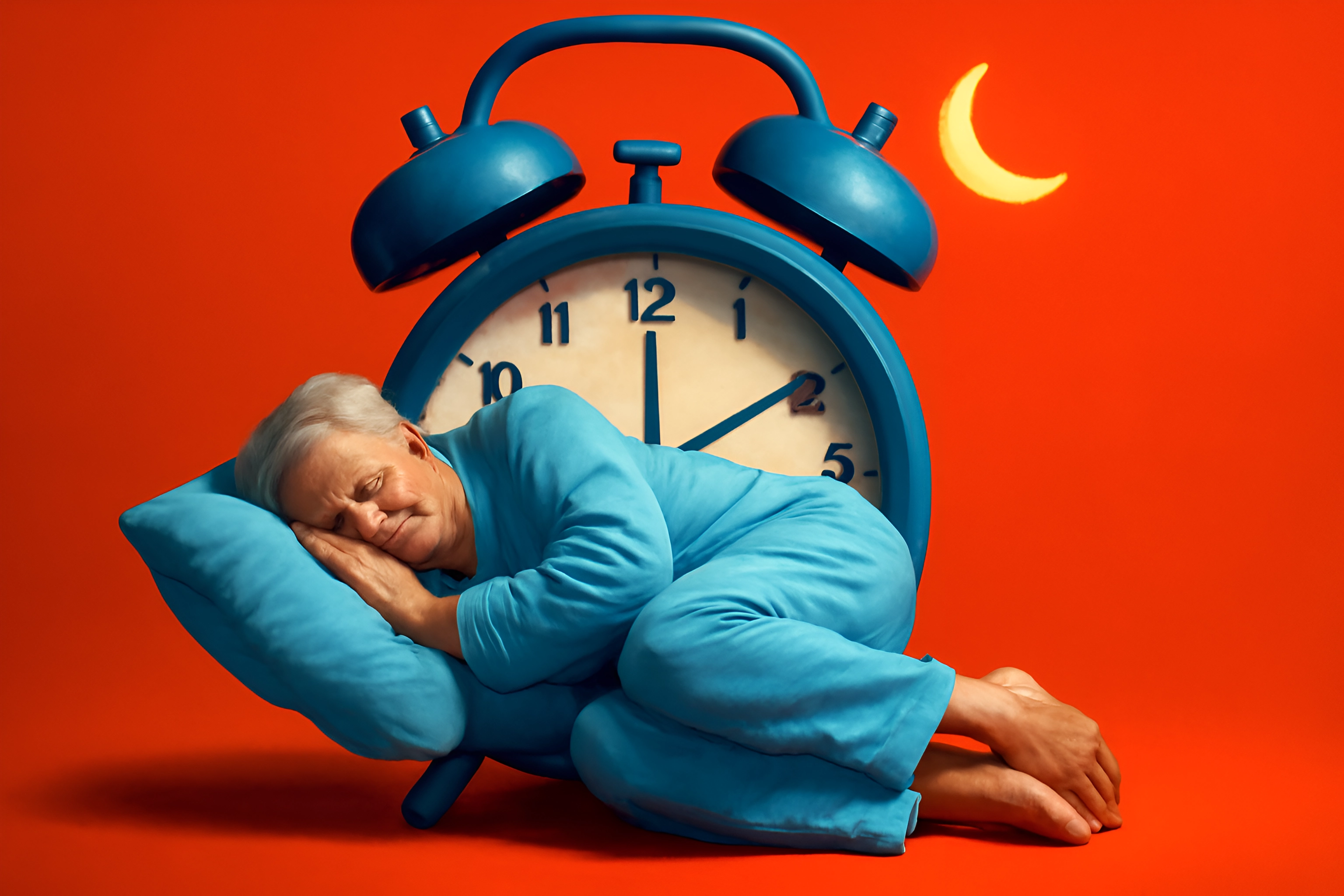
Does this sound familiar? You fall asleep without a problem, only to find yourself wide awake at 3 AM, staring at the ceiling. You're not alone, and it's not your fault.
That feeling of being tired but wired, the frustration of your mind racing when all you want is rest, and the exhaustion that follows you into the next day—it’s a story we hear all too often. It can feel like your own body is betraying you, robbing you of the deep, restorative sleep you need to feel vibrant and alive. But what if the solution wasn't about fighting your body, but understanding it?
In this post, we're not just giving you generic sleep tips. We're diving into the science to explain why this happens as we get older. More importantly, we’ll provide a clear, actionable roadmap to help you work with your body, not against it, to finally get the restorative sleep you deserve. By understanding the changes in our internal clock, we can make simple, powerful adjustments to our daily routines to align our sleep cycle with our natural aging process.
Why Does Sleep Change After 50? The Science Explained
It’s not just in your head; the very architecture of your sleep undergoes a significant transformation as you age. This isn't a sign of failure, but a natural biological shift. Understanding the mechanics behind this change is the first step toward reclaiming your nights and your energy.
Meet Your Circadian Rhythm: Your Body's Master Clock
Think of your circadian rhythm as your body's internal 24-hour master clock, located deep within your brain. This clock is the conductor of your biological orchestra, telling your body when to feel awake and alert, when to release hormones, and, crucially, when it's time to power down for sleep. For decades, this rhythm likely ran with predictable precision, but as we age, the conductor can start to lose its timing.
This internal clock is profoundly influenced by external cues, with the most powerful being light. When your eyes detect sunlight in the morning, it sends a strong signal to your brain to suppress sleep hormones and start the day. Conversely, darkness in the evening signals that it's time to produce melatonin, the hormone that facilitates sleep, preparing you for rest.
The Great Sleep Shift: How Aging Affects Your Clock
As we move past 50, our internal clock often begins to shift. This phenomenon, known as Advanced Sleep Phase Syndrome, is a key reason you might feel sleepy earlier in the evening and find yourself waking up before the sun. Research from 2017 on sleep in normal aging confirms that these changes in circadian rhythms lead to earlier sleep timing and more fragmented sleep in older adults.
This shift is compounded by hormonal changes. Your brain's production of melatonin naturally declines with age, making the "time for bed" signal weaker and making it harder to fall and stay asleep. At the same time, the stress hormone cortisol can begin to rise earlier in the morning, acting as a natural alarm clock that goes off long before you want it to.
Furthermore, the very structure of our sleep changes. We spend less time in the deep, restorative stages of non-REM sleep and more time in lighter sleep. Research from UC Berkeley highlights that deep sleep may act as a fountain of youth, and its decline is linked to memory consolidation issues because the brain regions that generate these deep sleep waves deteriorate with age. This shift to lighter sleep makes you more susceptible to being woken up by small noises, a change in temperature, or even your own thoughts.
How to Align Your Sleep Cycle With Your Natural Aging Process
Now for the good news: you have more power over your sleep than you think. It’s not about finding a magic pill, but about sending your body clear, consistent signals throughout the day. By strategically using light, movement, and routine, you can gently guide your internal clock back into a healthy rhythm.
Morning Rituals to Reset Your Clock
Your quest for better sleep doesn't start at 10 PM; it starts the moment you wake up. The first few hours of your day set the stage for the night ahead. Your primary goal is to send a powerful "wake up" signal to your brain to anchor your circadian rhythm for the next 24 hours.
The single most effective way to do this is to embrace morning sunlight. Aim for 15-30 minutes of direct sun exposure within an hour of waking. This doesn't mean you need to sunbathe; simply drinking your coffee on the porch or taking a brief walk is enough to signal to your brain that the day has officially begun, effectively shutting down melatonin production.
Consistency is your other secret weapon. Waking up at the same time every single day—yes, even on weekends—reinforces your body's sleep-wake cycle. A 2024 study confirmed that stable sleep patterns are linked to successful aging, showing that regularity is a key ingredient for better physical and cognitive health outcomes.
Daytime Habits for Deeper Sleep
The choices you make during the day have a profound impact on your ability to sleep at night. Regular physical activity is a powerful tool for improving sleep quality, but timing is everything. Moderate exercise, like a brisk walk or swimming, can help you fall asleep faster and spend more time in deep sleep, but an intense workout too close to bedtime can be overstimulating. For some great, joint-friendly options, check out these low-impact cardio ideas for heart health.
Naps can be a double-edged sword. While a short power nap can be rejuvenating, long or late-afternoon naps can steal sleep pressure from the night, making it harder to fall asleep. If you need a nap, keep it to 20-30 minutes and take it in the early afternoon, no later than 2 PM.
Finally, be mindful of what you consume. As we age, our bodies metabolize caffeine and alcohol differently. That afternoon coffee might linger in your system longer than it used to, disrupting your sleep architecture hours later. Consider making 2 PM your caffeine cutoff and be aware that while alcohol might make you feel drowsy initially, it fragments sleep later in thenight, leading to those dreaded 3 AM awakenings.
Evening Wind-Down for Restful Nights
The 60-90 minutes before you get into bed are sacred. This is your "power-down" period, where your goal is to transition your body and mind from the busyness of the day to a state of calm readiness for sleep. The first step is to control your light exposure. Bright overhead lights and the blue light emitted from phones, tablets, and TVs are powerful stimulants that suppress melatonin production.
Dim the lights in your home an hour or two before bed and, most importantly, put the screens away. Instead, create a relaxing ritual that signals to your body that sleep is coming. This could be reading a physical book (not on a backlit device), doing some gentle stretching, listening to calming music, or taking a warm bath, which can help lower your core body temperature and promote sleepiness. For more detailed guidance, explore these mindful evening routines to optimize sleep quality after 50.
Lastly, ensure your bedroom is a sanctuary for sleep: cool, dark, and quiet. Use blackout curtains, wear an eye mask, use a white noise machine or earplugs—do whatever it takes to create an environment that is free from disruptions. This foundational step of sleep hygiene makes all your other efforts more effective.
Bonus: Practical Circadian Rhythm Sleep Tips for Older Adults
Even with the best habits, you might still have challenging nights. Here are two common scenarios and how to handle them with a calm, strategic approach that won't sabotage your efforts.
What If You Wake Up in the Middle of the Night?
The absolute worst thing you can do when you wake up at 3 AM is to lie there watching the clock. This creates a cycle of anxiety and frustration, teaching your brain to associate your bed with being awake and stressed. Instead, follow the "20-Minute Rule."
If you've been awake for what feels like 20 minutes, get out of bed. Go to another room and do something quiet and relaxing in very dim light—read a boring book, listen to a meditation app, or do some light stretching. The key is to keep it non-stimulating. Only return to bed when you start to feel genuinely sleepy again.
This technique helps break the negative association between your bed and wakefulness. It puts you back in control and prevents one bad night from spiraling into a week of poor sleep. It’s a mental reset that reinforces the idea that your bed is for sleeping, and nothing else.
Should You Consider a Melatonin Supplement?
With melatonin available over the counter, it's tempting to see it as a quick fix. While it can be helpful for some people, particularly for resetting the clock due to jet lag or shift work, it is not a magic bullet for chronic sleep issues. The quality and dosage of over-the-counter supplements can vary wildly, and it doesn't address the root causes of poor sleep.
It's a tool, not a cure. More importantly, it can interact with other medications, including blood thinners and blood pressure drugs.
Therefore, it is absolutely crucial to follow this advice: Always consult with your doctor before starting any new supplement, including melatonin. A healthcare professional can help you determine if it’s the right choice for your specific situation, recommend a proper dosage, and ensure it won’t cause any harmful interactions.
Conclusion: Embracing Your Body's Rhythm
Waking up in the middle of the night isn't a personal failing; it's a biological signal. Your body is changing, and your sleep patterns are changing with it. The key to unlocking deep, restorative rest lies not in fighting this process, but in mindfully adapting to it.
By using morning light to set your clock, creating consistent daily routines, and designing a peaceful evening wind-down, you can work in harmony with your body's natural rhythm. This isn't about turning back the clock on aging; it's about mastering the clock you have now. By making these small, consistent changes, you can reclaim your energy, sharpen your mind, and prove that vibrant, restorative sleep is absolutely possible at any age.
What's one change you're going to try this week? Share your favorite wind-down ritual in the comments below—we'd love to learn from our community




